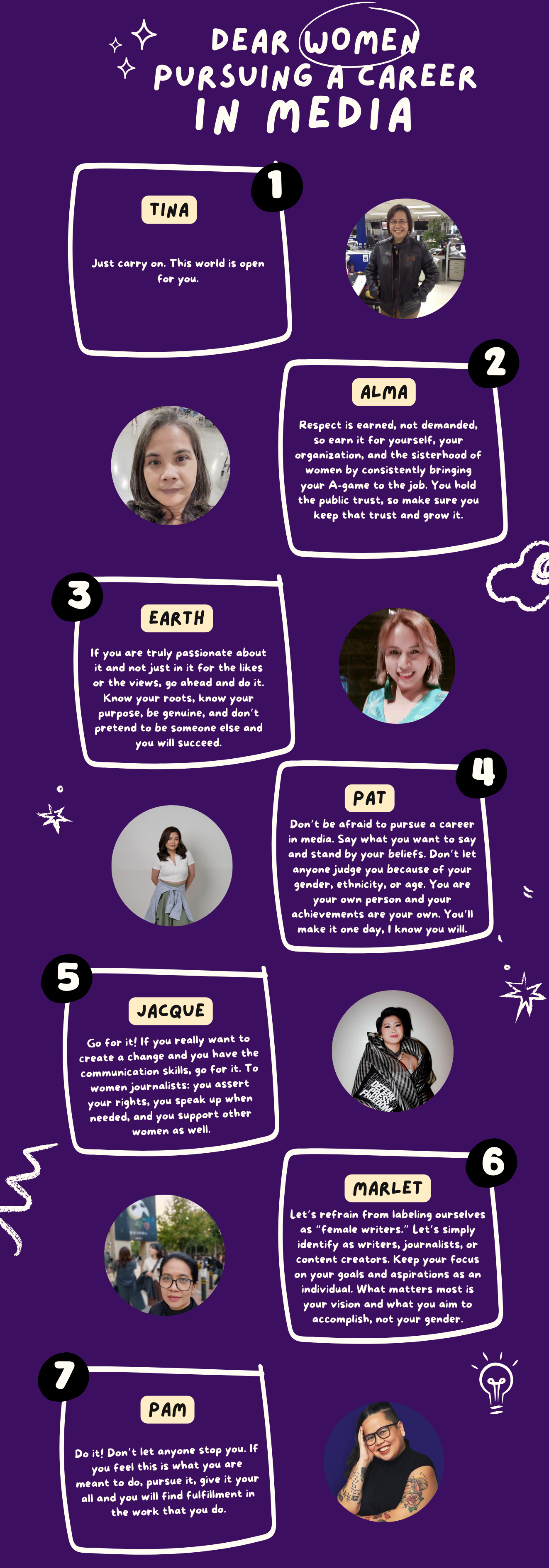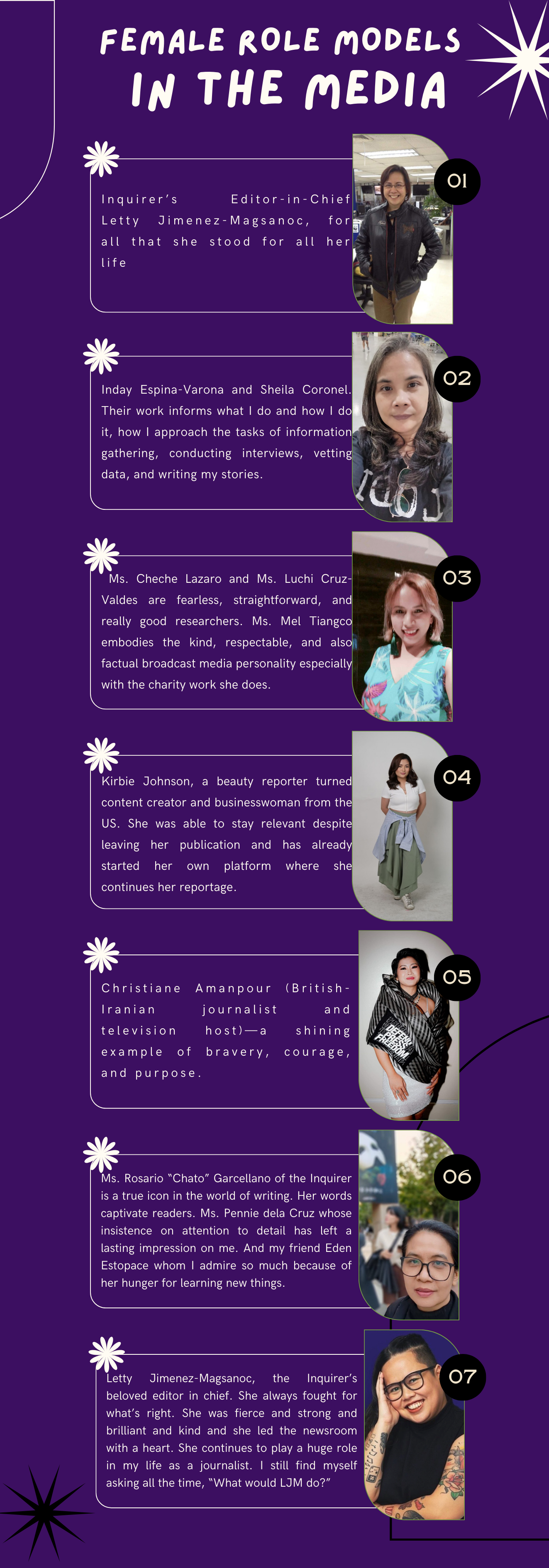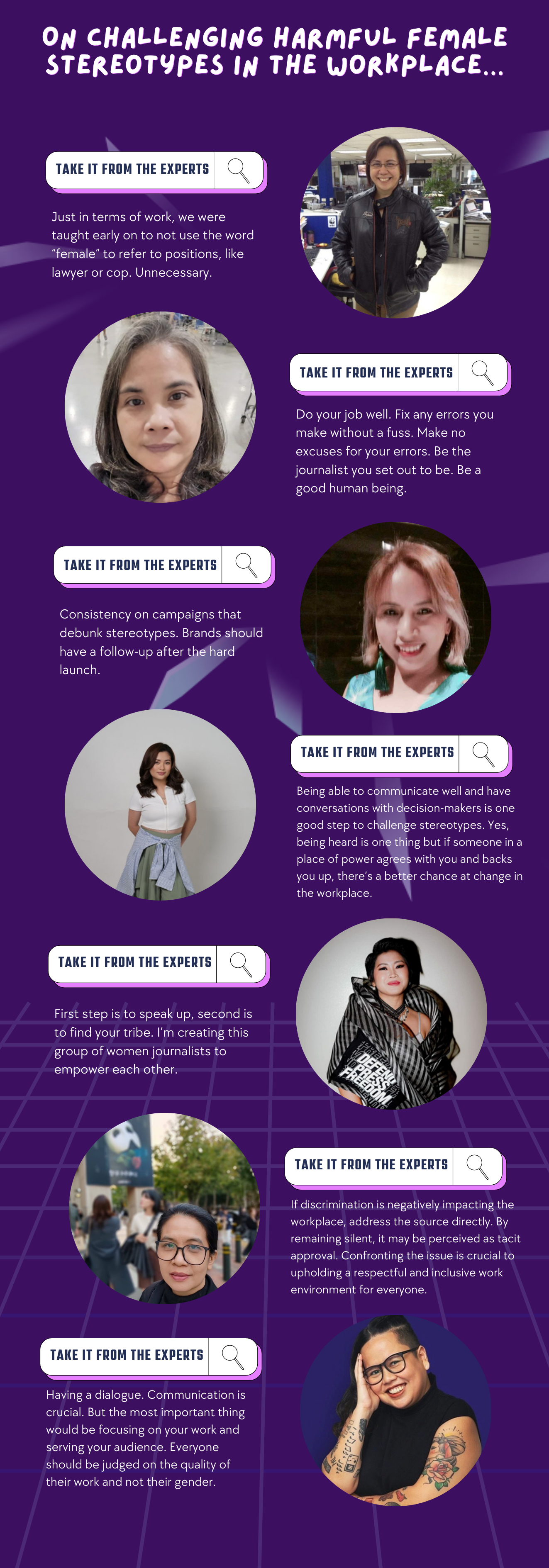March marks National Women’s Month in the Philippines, a time to reflect and celebrate the remarkable contributions that women have made in forging gender equality. This dedicated celebration honors every woman’s achievement across fields as diverse as science, transformative technology, bridging the digital gender gap, and shaping the landscape of economics, politics, and media. CID Communication has wholeheartedly pledged to stand by and uplift all women. Their commitment echoes through their actions, fostering an environment where women’s voices are amplified, their achievements celebrated, and their rights fiercely protected. As part of the month-long celebration of women empowerment, CID reached out to several women in the media industry to gain insights and see what still needs to be done to support women in Philippine media.
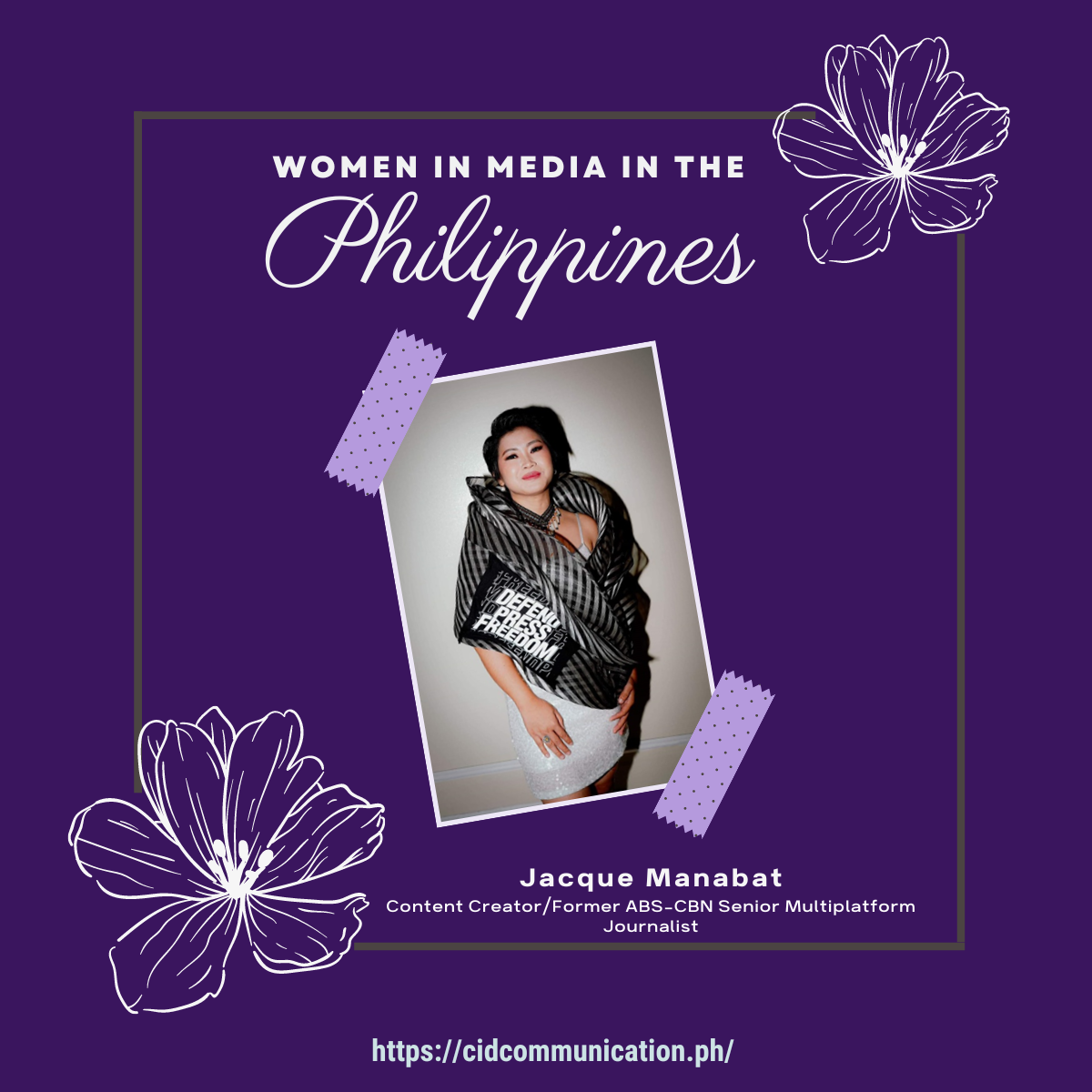
Jacque Manabat, a senior multiplatform journalist with 17 years of experience in the media industry, is celebrated for her innovative storytelling and unwavering commitment to reaching a broader audience. Throughout her career journey, Manabat encountered numerous instances of misogyny while at work, including rebuttals and text messages infused with sexual innuendo. As a journalist, she persevered, brushing aside these challenges, and steadfastly focused on conveying the narratives of others. “Speak up and find your tribe,” is Manabat’s counsel for those facing harmful female stereotypes in the workplace.
In response to the misogynistic remarks she received, Manabat shared her advocacy to create a safe space for women journalists. Her goal is to empower women in the media industry by encouraging them to support each other, “because no one’s doing that for us, we are always doing that for the public,” she said.
“We experienced misogynistic remarks in this unsafe space outside. But inside the industry, there are also perpetrators and we cannot deny that it happens. It’s just under wraps because we don’t want the spotlight on us, since we used to tell the stories about other people and not ours. And I think that’s the characteristic of a journalist that maybe we should look into, especially the women. Sometimes, female journalists are oblivious to the fact that they are making harmful remarks towards fellow female journalists,” said Manabat.
Manabat also stood firmly behind the Safe Spaces Act (Republic Act No. 11313), designed to safeguard women in the industry. However, she underscored that having these laws alone won’t suffice. True effectiveness requires collective efforts—support from groups, meaningful conversations, and informative briefings—all working together toward success.
Moreover, she lamented the lack of a clear organizational policy to address sexual harassment cases within newsrooms. This crucial issue, often overlooked, demands open discourse and proactive measures. Only then can the media industry thrive, free from the shadows of harassment and inequality. This call to action promotes solidarity, amplifies voices, and breaks down stereotypes. Manabat’s dedication to fostering a supportive community offers hope to women facing professional obstacles.
Filipinas are undeniably shattering barriers in media, defying cultural norms. They recognize the shifting times and the significance of embracing change while still respecting tradition. Manabat acknowledged that the “Me Too movement” has further empowered women, encouraging them to break their silence. In her view, challenging the status quo is imperative.
Manabat also underscored the need for strong female presence, especially in a media landscape that can appear male-dominated. While newsroom leadership in the Philippines is predominantly female, broader societal perceptions still tend to favor men as decision-makers.
While she observed that her company did not have well-defined gender policies, she considers herself fortunate to be part of a media industry that acknowledges the strength of women, particularly under the leadership of the decisive and strong-willed woman, Ms. Ging Reyes, Former Head of ABS-CBN Integrated News.
Manabat has consistently pushed boundaries, embracing new platforms and techniques to deliver accurate information and empower viewers. Notably, she made history as Southeast Asia’s first journalist to utilize TikTok as a news platform. Through this innovative approach, she revolutionized storytelling, blending information with entertainment.
During the peak of COVID-19 disinformation and misinformation, Manabat harnessed TikTok’s potential. She used the platform to disseminate trustworthy information, ensuring that her audience received reliable updates. Her enthusiasm knows no bounds; she constantly seeks new opportunities to engage a wider audience and reclaim lost viewership.
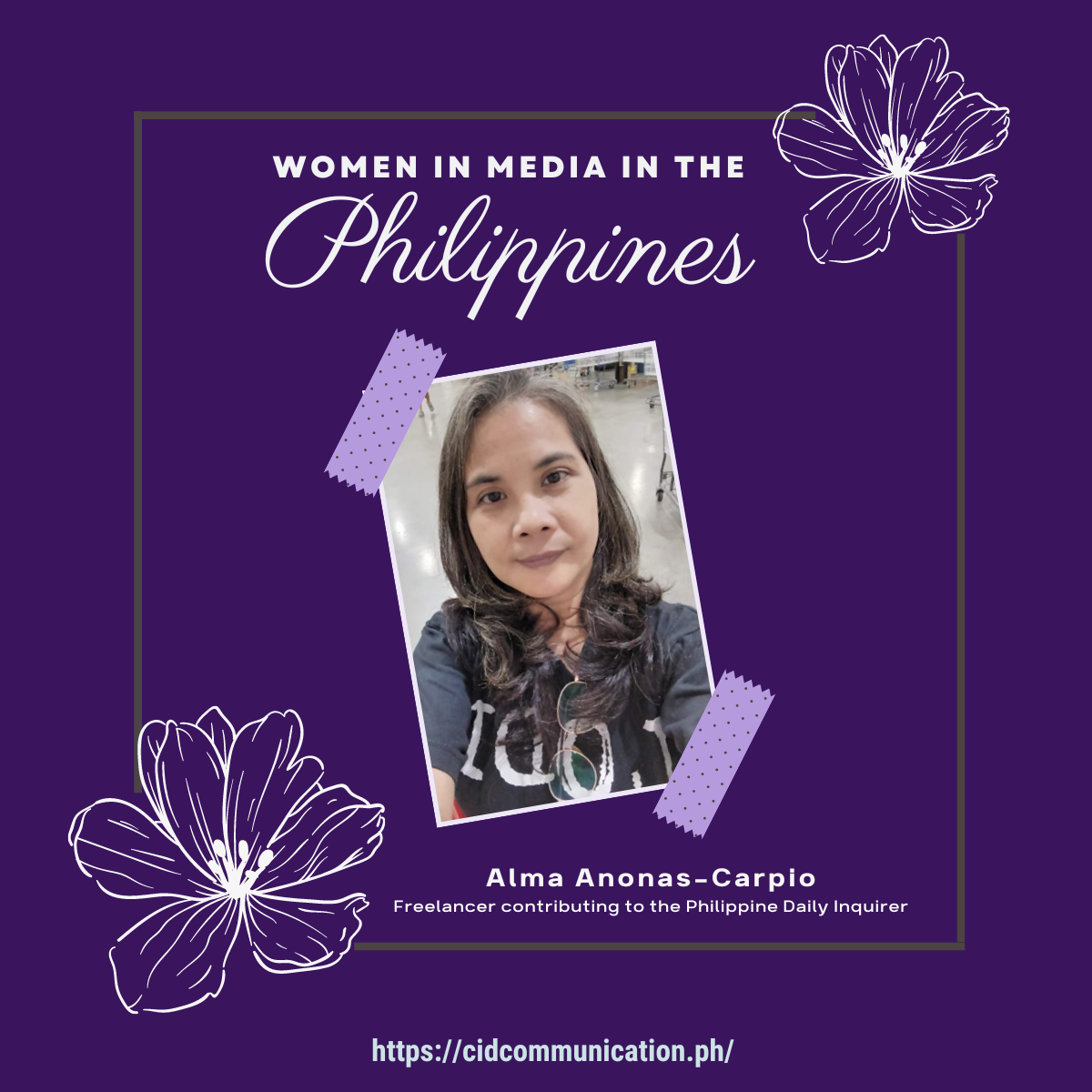
Alma Anonas-Carpio, a distinguished figure in the media industry, boasts an impressive three decades of experience. Her contributions span various domains, and her accomplishments have left a lasting impact. As a journalist, she has wielded the power of words, shaping narratives and informing the public.
Carpio has experienced a supportive environment in newsrooms, where her immediate superiors back her both as a journalist and as a woman. However, she has also encountered discrimination within her profession from retired military and police generals, as well as retired judges. These individuals, products of a different era, adhered to an accepted standard of internalized misogyny.
“As a reporter, I’ve been dismissed by interview subjects and sources because I am female. I dealt with that by simply keeping to my tasks at hand and refusing to be distracted by the misogyny my interview subjects tried to impose by saying: ‘Back to you’ and reiterating or rephrasing my questions,” said Carpio.
As a woman working in the field, she experienced physical harassment. Diplomatically, she requested the harassers to cease their actions. If they persisted, she drew upon her self-defense expertise to create distance and moved to a safer area. Carpio promptly notified her superiors and media outlets, including the National Press Club, about the incidents. When required, she lodged complaints with local authorities and the police. Her primary focus was to mitigate risk while carrying out her journalistic responsibilities.
She established guiding principles to address detrimental female stereotypes in the workplace, recognizing that unexpected situations can arise: perform your job diligently, address mistakes without unnecessary drama, and take responsibility without excuses, be the journalist you set out to be and be a good human being.
Additionally, Carpio emphasized that good journalism is all about fairness based on merit. Journalists follow the Code of Ethics to empower everyone, no matter their gender. The real challenge is applying these principles consistently every day in the industry, using the best practices, ethical guidelines, and knowledge.
In a predominantly Christian country where Catholics form the majority, stereotypes about women working in the media persist. These stereotypes cast women as dutiful daughters, nurturing mothers, and devout churchgoers. Despite women’s increasing presence in professional careers, these preconceptions endure.
Carpio challenged these norms. She highlighted that good journalism relies on merit, regardless of gender. However, she faced criticism for asking tough questions, with some questioning her femininity. Assumptions about her attire and stature persist, revealing the need to break free from outdated perceptions.
Female representation in media plays a crucial role in shaping the industry. Their contributions are not only significant but also indispensable. Without women, these media outlets would face considerable challenges. In newsrooms, women take on diverse roles—from researchers and proofreaders to reporters and editors. They are dedicated workers, supportive colleagues, and mentors.
This transformation has reshaped how women are perceived within news organizations. They now command respect from both their peers and male colleagues. Moreover, media acts as a catalyst for women’s empowerment. Stories created by and for women are accessible to all genders. Journalists, regardless of gender, work together to drive positive change and equip male advocates to champion gender equality.
“The evolution of ‘women’s work’ in media has developed into the practice of opening up positions in news organizations across all levels. It has resulted in women being seen primarily as humans with good skill sets who contribute well to their workplaces, rather than as women working in a male-dominated field. And I call that a win,” said Carpio.
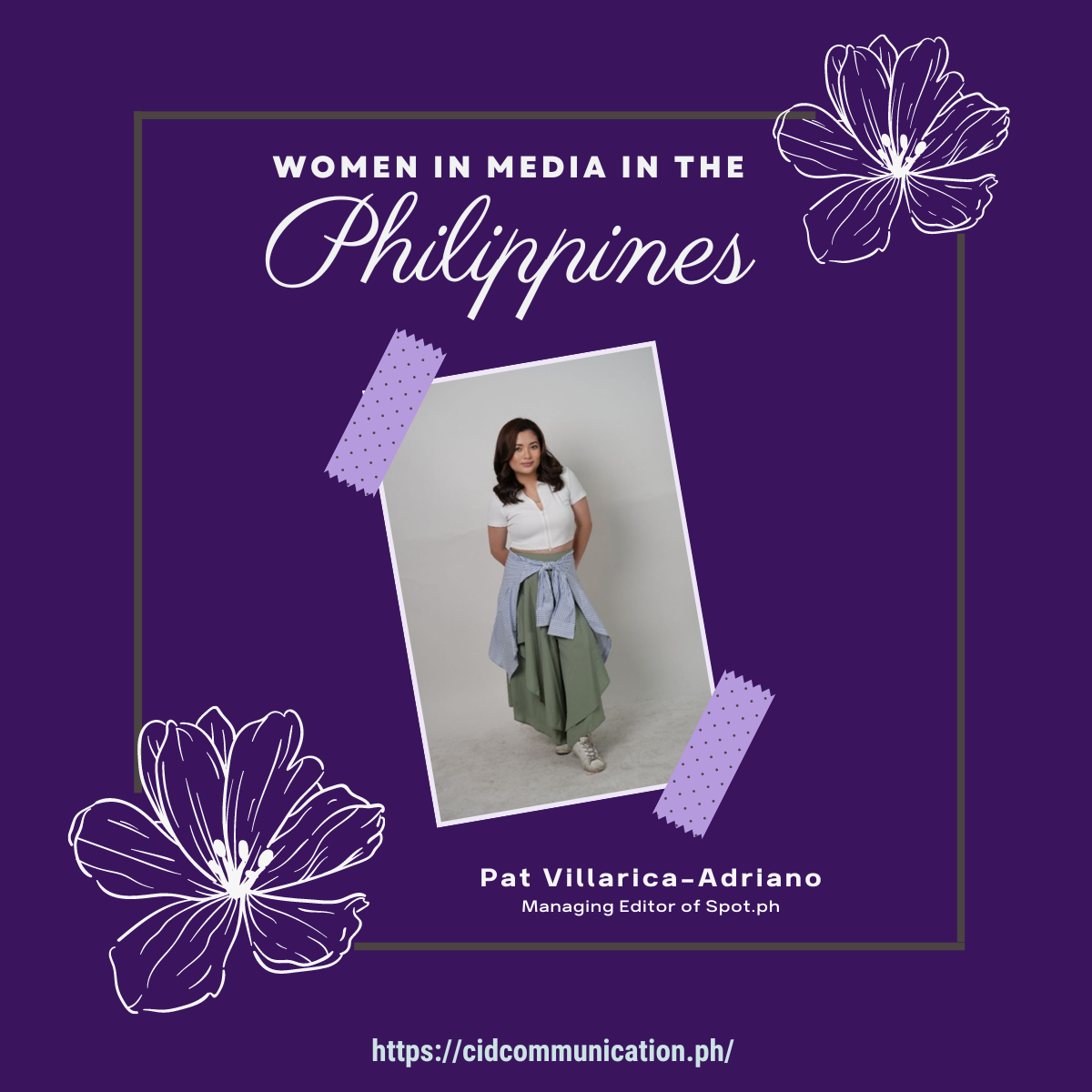
Pat Villarica-Adriano, a writer and marketing and advertising professional currently based in Manila, has 10 years of combined experience in content creation, digital marketing, public relations, and account management. Her diverse background equips her with valuable insights and skills across various domains.
It’s fascinating that one of the primary reasons that motivated her to pursue a career in media was the movie The Devil Wears Prada. The film coincided with her high school years, and she found the characters’ jobs intriguing. Additionally, her early exposure to media—thanks to her father, a fashion photographer—fueled her desire to embark on a media career.
Adriano believes that her career in journalism allows her to become the best version of herself. Despite considering herself an introvert, her role in media has compelled her to speak out more boldly about her convictions. Additionally, working in media provides her with the opportunity to explore areas she wouldn’t otherwise pursue outside of work.
Over the course of 10 years in the media industry, Adriano has been fortunate to never encounter gender-based discrimination. While age-related challenges have arisen, gender-related ones did not. Nevertheless, she does share her strategies for handling harmful female stereotypes within the workplace.
“I think being able to communicate well and have conversations with decision-makers is one good step to challenge stereotypes. Yes, being heard is one thing but if someone in a place of power agrees with you and backs you up, there’s a better chance at change in the workplace,” said Adriano.
Adriano highlighted that it’s important to have female representation in media due to the unfortunate prejudice against women in positions of power. While progress has been made, witnessing women with strong voices—voices that deserve to be heard—is essential for inspiring young individuals who aspire to occupy similar roles in the future. She also emphasized that it’s widely understood that rewards are based on achievements rather than gender. Success is attributed to competence and performance.
In the Philippines, cultural norms and traditions have historically privileged men due to our patriarchal society. However, significant progress has been made. The media now actively shares stories about women, transforming how they are perceived. Women are gaining respect, finally being heard, and have come a long way.
Gone are the days when they were mere props on a soundstage. Nowadays, we witness shows anchored by full female panels, hosted by diverse groups of women spanning different age ranges. And let’s not overlook the influential female content creators who skillfully make powerful statements.
“In my perspective, the media—if led by a woman—properly highlights women’s empowerment. I’m not saying that our male counterparts wouldn’t know how to bring light to the subject in a tasteful manner but there’s something different when a woman speaks about it…because we’ve actually lived it, you know? We know the struggles first hand so we know how to shed light on certain topics,” said Adriano.
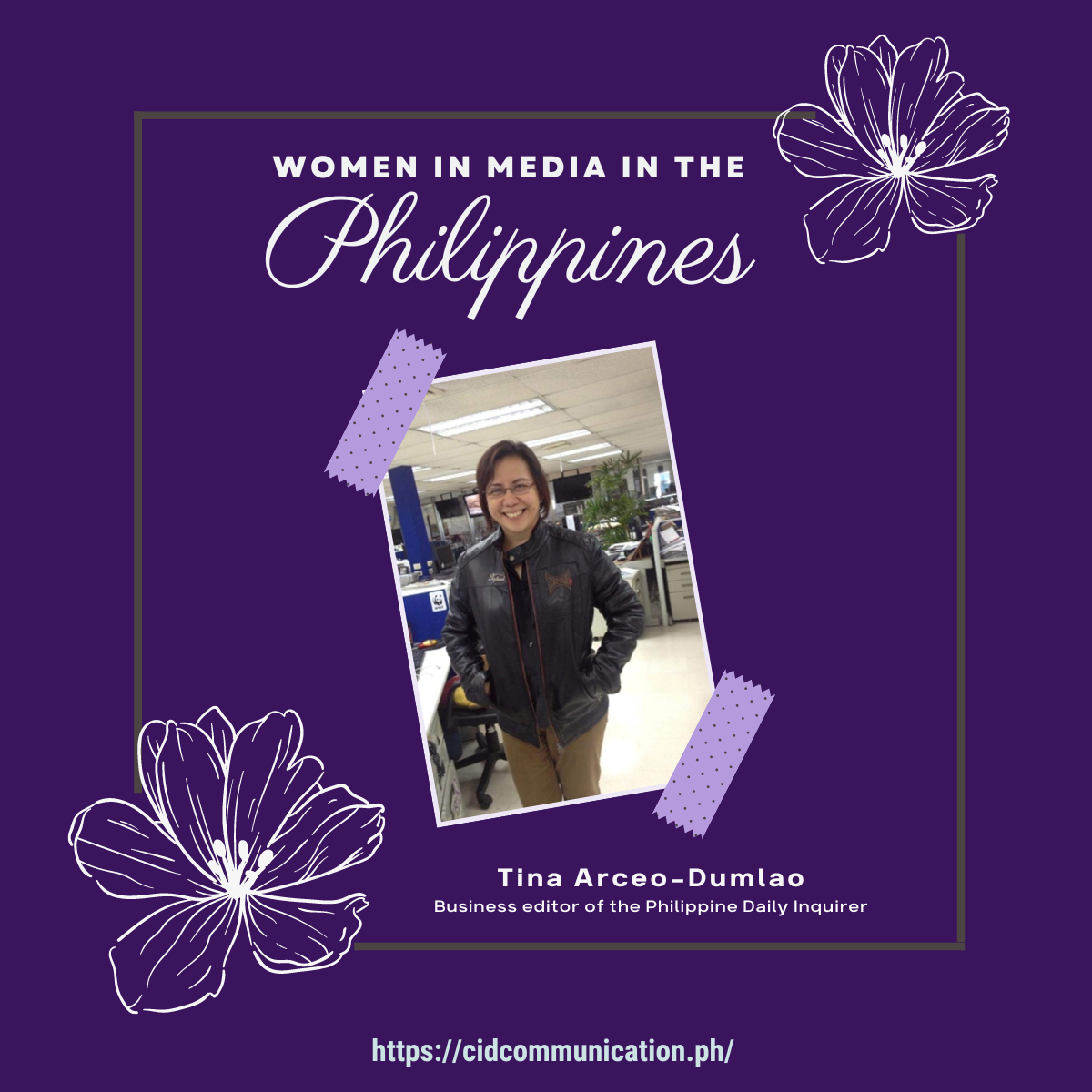
Tina Arceo-Dumlao, an accomplished journalist and business editor at the Philippine Daily Inquirer, has received multiple awards for her outstanding work in journalism. Her dedication and expertise shine through her remarkable career. Dumlao studied Journalism at the University of the Philippines. Having received free education that taught her essential skills, Tina now contributes to the community through meaningful service.
Her 33 years of experience in the media industry have allowed her to contribute significantly to the field. Whether through her insightful reporting or her active involvement in community initiatives, Tina Arceo-Dumlao continues to be a beacon of integrity and social responsibility, using her platform to inform, inspire, and uplift others.
Over her impressive three-decade career in the media industry, Dumlao has been fortunate to avoid any instances of discrimination. She actively advocates for strategies that challenge harmful female stereotypes within the workplace. Specifically, when discussing work roles, she emphasizes the importance of avoiding unnecessary gender distinctions. For instance, terms like ‘female lawyer’ or ‘female police officer’ are avoided. When asked about measures to support and empower women in the Philippine media industry, Dumlao simply responded, “Just treat women the same way as men.”
Dumlao emphasizes the critical importance of having female representation in Philippine media. It’s essential to recognize that women should be free to pursue their aspirations, just like men. If men can achieve certain roles and responsibilities, so can women. She also points out that, to her knowledge, the Inquirer does not have specific gender policies. Within the organization, where predominantly female leadership prevails, men and women have long been regarded as equals.
Cultural norms and traditions in the Philippines significantly influence the status of women in media. Dumlao emphasized that within this profession, women are treated as equals. Media, as a field advocating for justice, may be less susceptible to biases.
She highlighted a growing awareness of the importance of featuring impactful women in the industry. Such move reflects a deliberate intention to amplify women’s voices and contributions in the media landscape. It aligns with her view on how the media plays a significant role in highlighting women’s empowerment: by writing about women’s stories—their trials, tribulations, and triumphs.
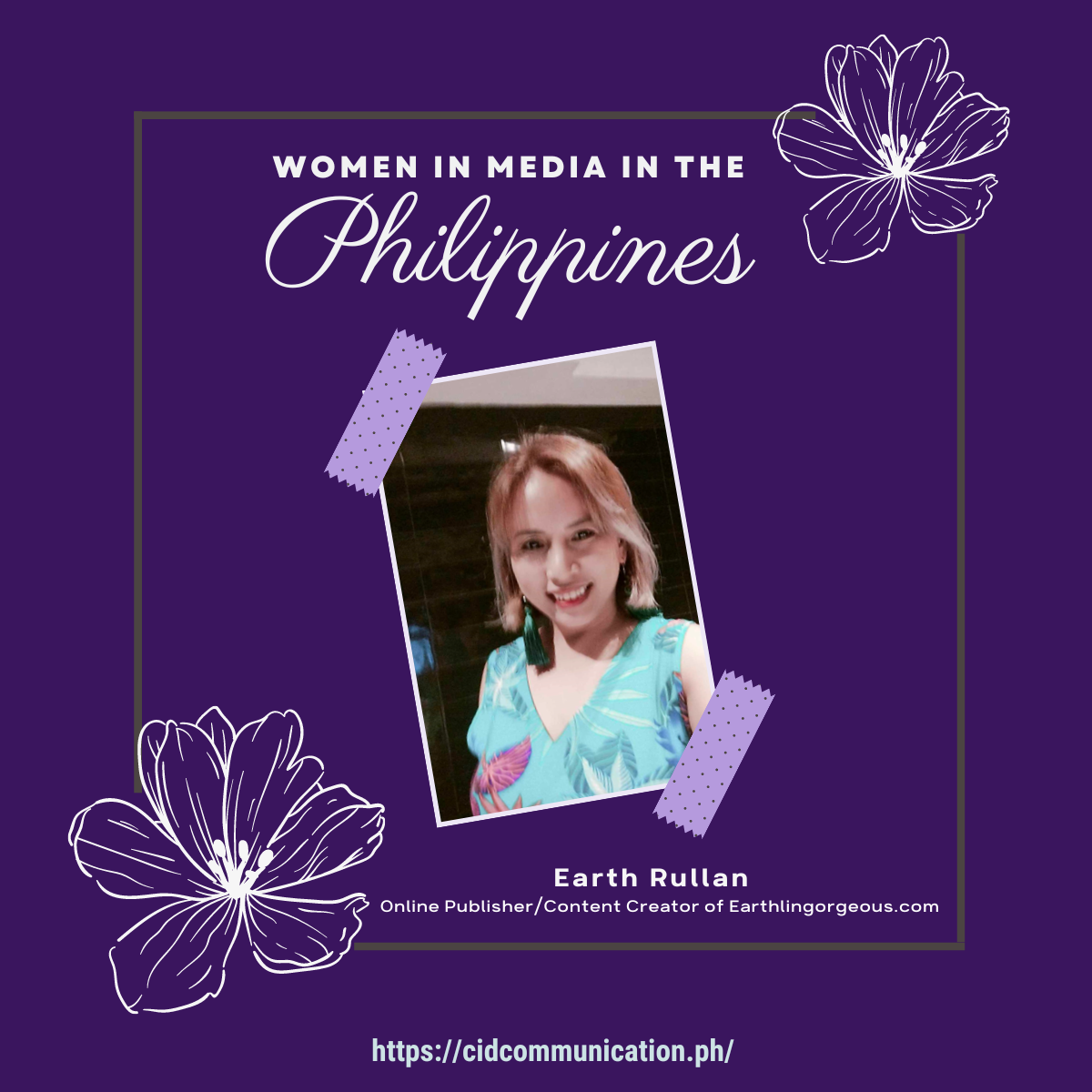
Earth Rullan, a seasoned social media influencer and blogger, leverages her 26 years of media industry experience to raise awareness about products, destinations, advocacy, services, and people.
Her genuine desire to inform, educate, and inspire people gives her motivation to continue her work in the media industry. Having a creative mind, abundant opinions, and fearlessness, Rullan speaks candidly, unafraid to express her thoughts as they are. Unlike embellishing to please others, her genuineness fosters trust and has sustained her over time.
Rullan, despite not conforming to typical stereotypes, encounters discrimination due to her unique circumstances. Although she is not married, she is a single mother. Furthermore, her appearance challenges conventional expectations related to her age.
“The discrimination goes along the lines of ‘mom bloggers are just often married with kids’ and ‘fashion and beauty bloggers are just this certain age’ and ‘tech bloggers are just men who do in-depth tech reviews.’ I am in the gray of it all and a lot of brands think that’s a gray market but that is an untapped market that we all should start serving,” said Rullan.
In the Philippines, unmarried mothers encounter scrutiny, while dating foreigners is often stigmatized as gold-digging. Revealing skin is met with judgment, and speaking candidly is considered impolite. Historically, women were expected to marry if they had children and exhibit timidity and humility. This traditional perception of women persists in the country.
She firmly believes that female representation in Philippine media is important. Rullan sees women as embodying a delicate balance of strength, bravery, and empathy, which are essential qualities for the industry. Despite not having gender policies in the online media, she remained fully aware of gender discrimination prevalent in other sectors. While the internet has leveled the playing field, granting equal opportunities to all, she acknowledges that this equality can sometimes be exploited, necessitating the establishment of boundaries.
Rullan acknowledged her lack of awareness regarding initiatives supporting women in the media industry. However, she emphasizes that the online media sphere functions independently, providing empowerment to individuals from diverse backgrounds.
Furthermore, the role of women in Philippine media has significantly evolved. Rullan underscored that the industry is no longer male-dominated, yet challenges remain. When a woman appears delicate or pretty, there’s an automatic assumption of vulnerability, which has both positive and negative aspects.
Media plays a pivotal role in empowering women. As women are now portrayed as achievers and independent individuals, much has changed since earlier times. “If the media continues to highlight women’s strength, women will definitely rule the world even if this is a male-dominated world still,” she said.
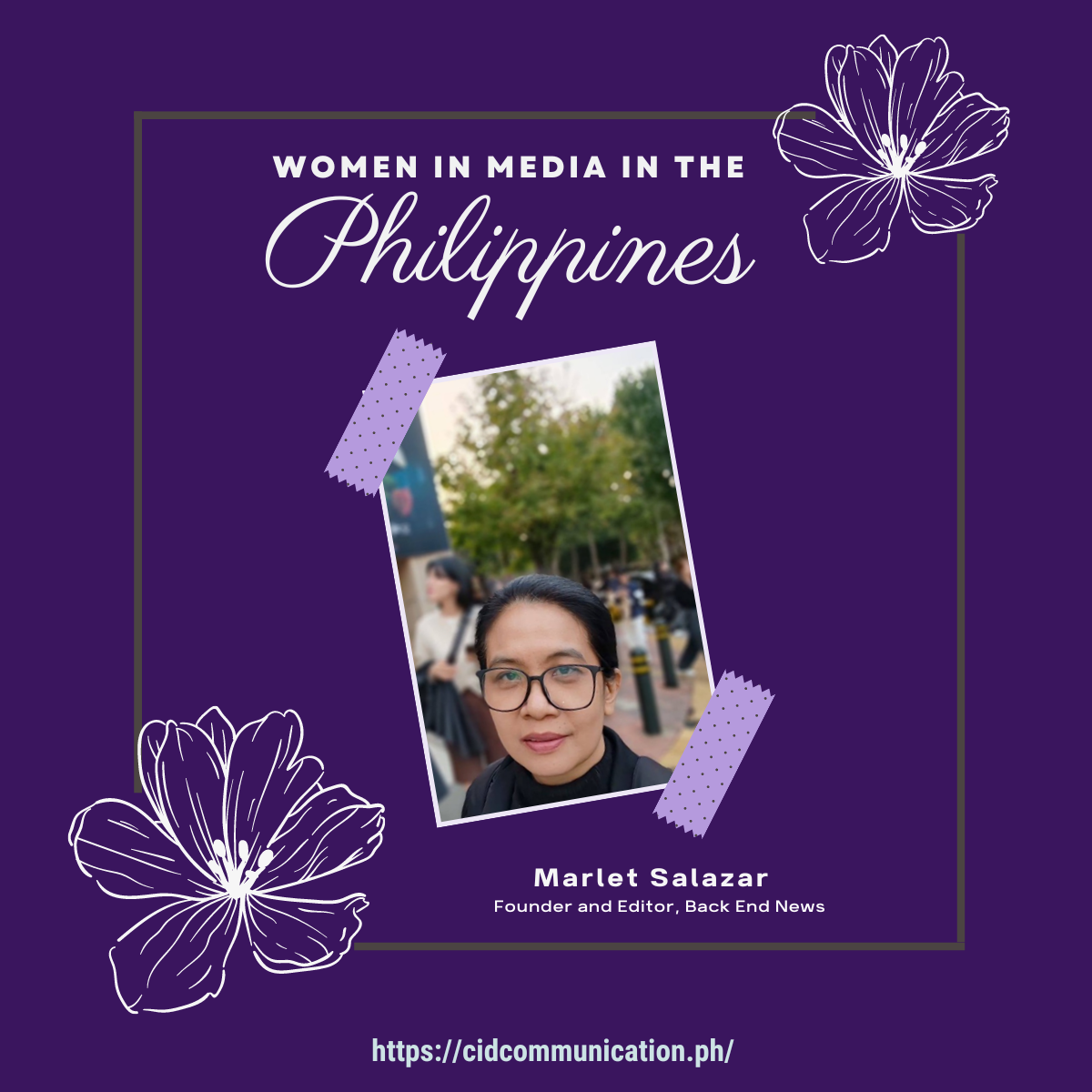
Marlet Salazar, the visionary founder of Back End News, has carved out a niche in the tech industry. Armed with a journalistic background and an unwavering passion for technology, she launched Back End News with a clear mission: to provide insightful coverage that caters to both tech enthusiasts and seasoned professionals.
Her extensive experience in the media industry has sharpened her critical thinking and ignited her curiosity, resulting in an approach that is meticulous and inquisitive. Through her platform, Salazar continues to elevate the discourse around technology, bridging the gap between information and understanding.
Despite being a respected tech maven, Salazar still encountered countless instances of discrimination. Many Filipino executives have failed to acknowledge her expertise in technology, especially in enterprise technology. However, Salazar remains undeterred. She steadfastly focuses on her work, refusing to feel compelled to prove herself to anyone.
“At this stage of my life, I’m secure in my place in the world and I’m relishing the journey. I strive to learn as much as possible, without aspiring to be a role model for others. We each forge our own path, but I’m committed to supporting and mentoring the younger generation as much as they’re willing to be mentored,” said Salazar.
She also mentioned that addressing workplace discrimination is crucial. When it negatively impacts the workplace, it’s essential to confront the source directly. Remaining silent might be perceived as tacit approval. By addressing the issue, we uphold a respectful and inclusive work environment for everyone.
Salazar expressed frustration with the term “male-dominated world.” She believes they should be recognized as writers and journalists, irrespective of gender, without the need for labels like “female writers” or “women journalists.”
“Women have been integral to the media landscape for years, so it’s baffling why this is still a contentious issue. Let’s focus on our skills and contributions, rather than perpetuating outdated gender stereotypes,” she said.
In today’s dynamic media landscape, inclusivity matters. When hiring writers, it is essential to recognize that their identity—whether related to gender or sexuality—should not influence the evaluation process. Instead, their value and compensation should be determined solely by their skills and the quality of their work. By dismantling these barriers, we pave the way for equal treatment, without perpetuating gender divisions.
Salazar firmly believed that assigning roles based on abilities fosters a fair and inclusive industry. This perspective transcends gender stereotypes, emphasizing that strength manifests in diverse ways. One powerful example lies in the physical experience of childbirth—an undeniable testament to women’s incredible resilience and fortitude.
Moreover, the impact of women extends beyond traditional media. Social media plays a crucial role in advocating for women’s equal representation across industries. This inclusivity and visibility are vital in shaping the future of women in various fields.
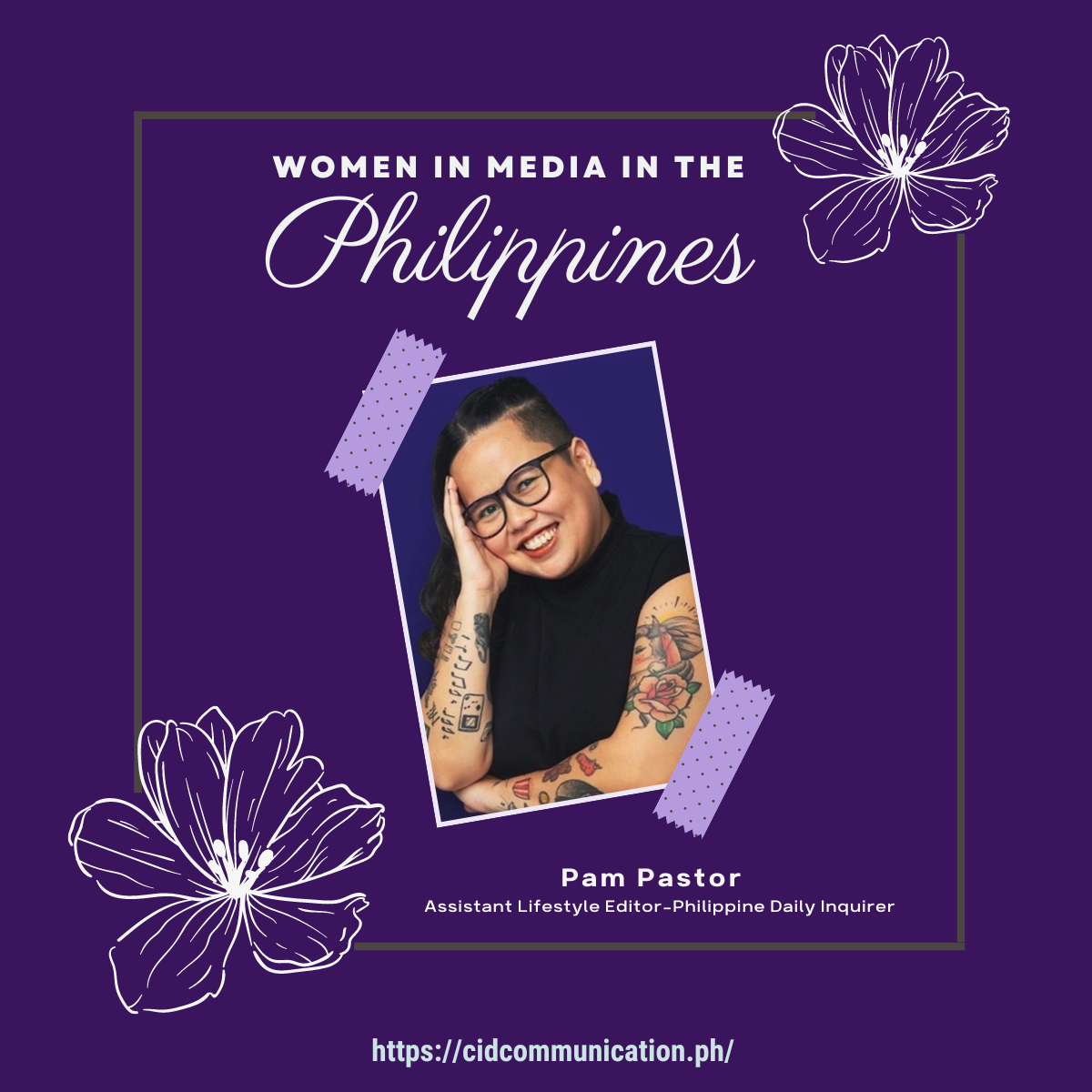
Over the course of 25 years in the media industry, Pam Pastor, a seasoned journalist and writer for the Philippine Daily Inquirer, has made significant contributions to the world of culture, entertainment, and lifestyle. Her journey began as a student correspondent at the Inquirer during her college freshman year. Driven by her unwavering love for writing, she became an integral part of the newspaper. Her career as a journalist not only honed her professional skills but also transformed her personally, from a shy, sheltered girl to a confident woman who has experienced the world.
Throughout her career, Pastor has encountered challenges, but she emphasizes that these obstacles are not solely due to her gender. She also considers that perhaps having a lifestyle and pop culture beat contributes to the perception that it is not a male-dominated field. She emphasized that Inquirer is a very good place for women, as the majority of its workforce—from the founder and chairman of the board to the editor-in-chief and reporters—are women.
“I can’t think of any moments of discrimination off the top of my head which I guess is a very good thing. I’d like to think that we’re lucky to be female journalists in the Philippines,” said Pastor.
She pointed out the importance of open dialogue because effective communication is crucial when addressing harmful female stereotypes in the workplace. However, the key priority should always be dedicating oneself to work and serving the audience. Ultimately, everyone should be evaluated based on the quality of their work rather than their gender.
Filipinos often perceive women as motherly and nurturing, and this perception extends to the media industry. According to Pastor, female editors can often act like moms or titas in the newsroom, nurturing their staff and having genuine care for them.
Furthermore, having female representation in the media is crucial because it ensures that women’s voices are heard. It brings diverse perspectives and allows us to highlight inspiring women and their remarkable achievements.
“We get to put the spotlight on inspiring women and the amazing things they do. We amplify the stories of all kinds of women. But that’s not all—we also get to discuss issues faced by women everywhere, in hopes of combating them and giving others the tools with which to overcome them,” she said.
Pastor’s perspective on seeing powerful women in Philippine media is indeed inspiring. It has encouraged more and more Filipinas to join the industry, and that’s a positive development, and as a journalist, their fundamental role has always been to amplify the voices of the voiceless and the oppressed and to tell the Filipino story.
Women journalists in the Philippines are forging a path toward the future of media. Despite the obstacles they encounter, these tenacious women persistently drive change, defy societal norms, and create a more inclusive and fair industry. Their narratives go beyond reporting news; they embody resilience, determination, and progress.
